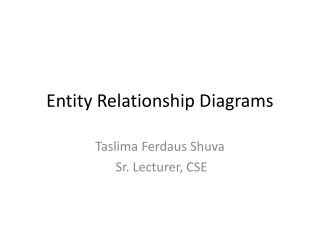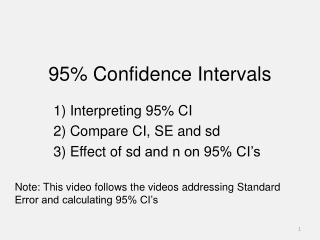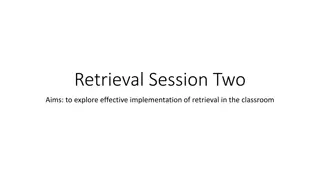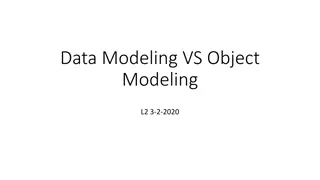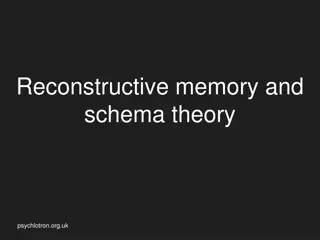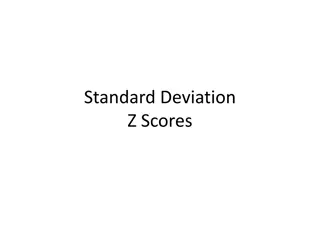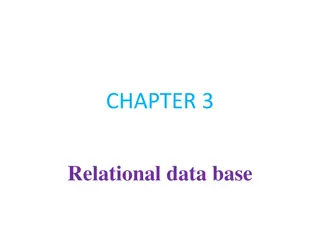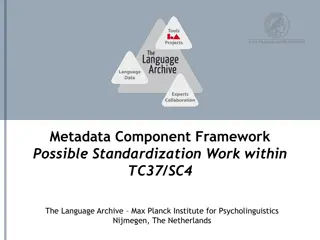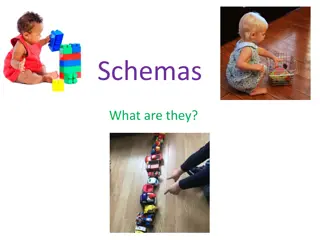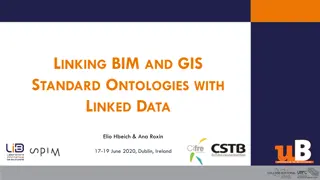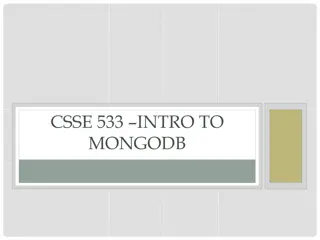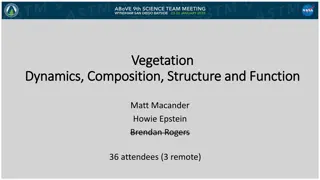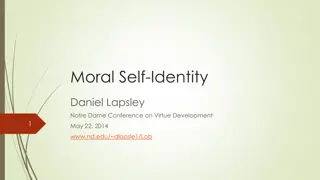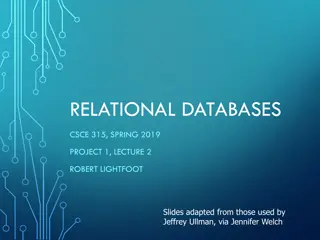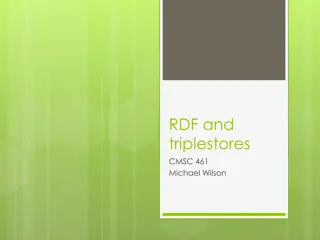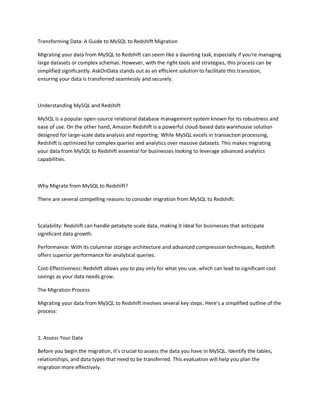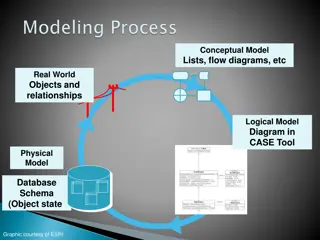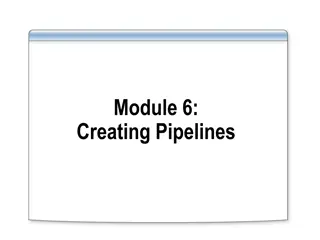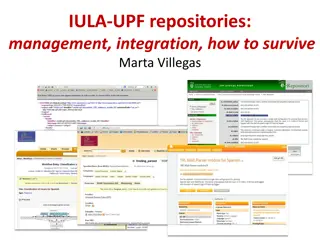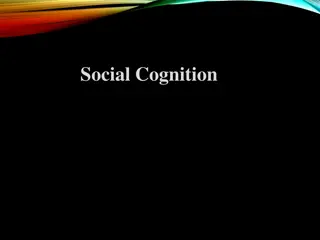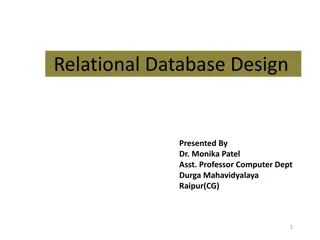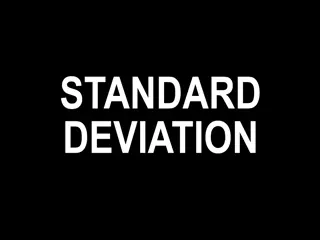Entity Relationship Diagrams
Understand entities, attributes, relationships, and database design stages. Learn about conceptual and logical designs, ER diagrams, and conversion to relational schemas. Explore ER models, schema, and basic concepts for effective database design.
2 views • 21 slides
Understanding 95% Confidence Intervals in Statistics
Confidence intervals are a key concept in statistics that provide a range within which the true value of an estimate is likely to fall. This video series explores the interpretation of 95% CIs, compares them to standard error and standard deviation, and explains how sample size and standard deviatio
2 views • 8 slides
Guidelines for Designing Person-Centered Care Pathway Schemas
This document provides a template and writing instructions for creating schemas for person-centered and integrated care pathways. It offers insights on visualizing the steps of a care pathway and emphasizes clear communication in the design process. Contact details are included for further guidance.
6 views • 21 slides
Understanding the Cognitive Approach to Behavior
Cognitive processing involves the various mental activities such as thinking, remembering, believing, and decision-making that influence our behavior. This approach examines how these processes are organized through memory, schemas, and thought, and how they are influenced by culture, gender, and em
5 views • 26 slides
Effective Implementation of Retrieval in the Classroom
Explore the implementation of retrieval practice in the classroom through quizzes and feedback to enhance learning. Understand key concepts like the testing effect, Ebbinghaus forgetting curve, spacing, and schemas. Avoid common pitfalls such as focusing on factual recall only, providing easy questi
1 views • 11 slides
Understanding Data Modeling vs Object Modeling
Data modeling involves exploring data-oriented structures, identifying entity types, and assigning attributes similar to class modeling in object-oriented development. Object models should not be solely based on existing data schemas due to impedance mismatches between object and relational paradigm
0 views • 17 slides
Understanding Reconstructive Memory and Schema Theory in Psychology
Explore the concepts of reconstructive memory and schema theory in psychology, delving into how encoding, storing, and retrieving information in long-term memory can lead to alterations based on our stored knowledge and experiences. Discover how schemas influence our interpretation of events, impact
0 views • 9 slides
Understanding Standard Deviation, Variance, and Z-Scores
Explore the importance of variation in interpreting data distributions, learn how to calculate standard deviation, understand z-scores, and become familiar with Greek letters for mean and standard deviation. Discover the significance of standard deviation in statistical analysis and the difference b
1 views • 18 slides
Evaluating Bartlett's 1932 Theory of Reconstructive Memory
In this task, you will evaluate Bartlett's theory of reconstructive memory by examining its claims regarding the influence of schemas, deliberate distortion of memories, and the accuracy of memory under the impact of schemas. Through a structured analysis, you will assess each claim, present evidenc
0 views • 5 slides
Workplace Exposure Standard for Silica Dust in Stone Benchtop Fabrication
Reduction in workplace exposure standard for respirable crystalline silica dust has been implemented, halving the national standard to 0.05 mg/m3. The new standard aims to protect workers in stone benchtop fabrication businesses from serious lung diseases caused by breathing in silica dust. Employer
1 views • 8 slides
Understanding Relational Databases and File-Based Systems
This chapter delves into the fundamental concepts of databases, comparing them to file-based systems, and highlighting the significance of relational databases in modern integrated AISs. It explores the difference between logical and physical views of databases, introduces key concepts such as DBMS
0 views • 70 slides
Alternative Encodings for GIS Systems - Action 2017.2 Report
Define alternative encoding rules for various application schemas in mainstream GIS systems. The report outlines the process of proposing and endorsing encoding rules, with a focus on GeoJSON, GML, database formats, and linked data. It also details tasks of developing specific encoding rules and enh
0 views • 11 slides
Standardization Process for Metadata Components in Language Archives
The standardization process for metadata components within TC37/SC4 at the Language Archive Max Planck Institute involves analyzing existing metadata sets, seeking input from the CLARIN EU community, and determining the next steps for standardization. The process includes forming submission groups,
0 views • 23 slides
Understanding Schemas in Child Development
Schemas are patterns of repeated actions exhibited by children during play, aiding in their cognitive and physical development. This article explores various types of schemas such as trajectory, enveloping, rotating, enclosing, transporting, connecting, transforming, and orienteering. Understanding
0 views • 11 slides
Linking BIM and GIS Standard Ontologies with Linked Data
Introduction to the need for seamless data interpretation between Building Information Model (BIM) and Geographic Information System (GIS), focusing on aligning BIM and GIS standard ontologies for semantic interoperability. Addressing the challenges of data interoperability layers and the characteri
0 views • 15 slides
Introduction to MongoDB: Document-Oriented Database Overview
MongoDB is a document-oriented database that uses JSON-like documents with dynamic schemas. Instead of SQL rows, MongoDB uses collections instead of tables and databases to organize data efficiently. The system is easy to start up and use, with a shell that acts as a JavaScript interpreter for CRUD
0 views • 15 slides
Insights into Vegetation Dynamics and Function in Ecosystems
Explore the complexities of vegetation dynamics, composition, structure, and function in various ecosystems through discussions on disturbance, wetlands, hydrology, and ecosystem services. Engage in ongoing dialogues about vegetation classification schemas and practical methods like traits mapping t
0 views • 9 slides
Understanding Moral Self-Identity Development
Situating moral self-identity within ethical theory and developmental psychology, this overview explores the centrality of morality within the self-concept. It discusses the chronic accessibility of moral schemas, the importance of strong evaluation in moral behavior, and the connection between mora
0 views • 33 slides
Fundamentals of Relational Databases in CSCE 315 - Lecture Highlights
Introduction to relational databases covering topics such as relational data model, schemas, converting from entity-relationship model, entity sets, relations, relationships, combining relations, and practical examples. Learn about storing data in tables, attributes, database organization, and the i
1 views • 18 slides
Insights into Social Psychology: Perception, Stereotyping, and Attribution
Social psychology explores how individuals are influenced by others, touching upon person perception, effects of physical appearance, cognitive schemas, stereotypes, ingroup/outgroup dynamics, and attribution processes. Factors like physical appearance and cognitive schemas shape our perceptions, of
0 views • 24 slides
Talking Between Services with gRPC - Marc Gravell
gRPC is a high-performance RPC stack developed by Google, suitable for efficient and cross-platform communication. This presentation by Marc Gravell explores the strengths, weaknesses, and new features in gRPC with a focus on .NET Core 3. Learn about protocol buffers and why gRPC is essential for in
0 views • 25 slides
Understanding Schema Theory: A Guide to Mental Representations
Schema theory in social science refers to the mental structures individuals use to organize knowledge and guide cognitive processes. This theory, prevalent in the 1980s, aids in interpreting and predicting the world by categorizing objects and events based on common elements. Schema theory in lingui
0 views • 20 slides
Tcl Package for SQLite3 Database Schema Migration
A Tcl package was developed to support schema migration in SQLite3 databases, enabling incremental or reversal changes to relational database schemas. The package includes functions for fundamental database operations like table creation, deletion, column addition, removal, and table renaming. By ge
0 views • 15 slides
Understanding Metadata and RDF in Data Management
Explore the significance of metadata in data management, the use of RDF and triple stores in organizing data, different reasoning methods available, and the importance of metadata structures. Learn how schemas in RDF allow for easy integration of diverse data types without requiring database reorgan
0 views • 18 slides
Seamless MySQL to Redshift Migration Your Essential Guide
Migrating your data from MySQL to Redshift can seem like a daunting task, especially if you're managing large datasets or complex schemas. However, with the right tools and strategies, this process can be simplified significantly. Ask On Data stands
0 views • 4 slides
Troubleshooting Tips for MatFlow Users
Troubleshooting guide for MatFlow users, addressing common issues such as missing extensions/schemas, outdated packages, Bad YAML problems, and finding errors in Python loading. Includes solutions and steps to resolve these problems efficiently. Visual aids accompany each tip to assist users in reso
0 views • 5 slides
Understanding Parents' Child Snack Schemas Through Mixed Methods
This study explores parents' perspectives on child snacking behaviors using a mix of qualitative interviews and card-sorting tasks integrated with cognitive schema theory. By analyzing data from low-income parents of young children, the research aims to uncover insights into how parental snack schem
0 views • 18 slides
Standard Aquifer Case Debrief Template
This template serves the goal of standardizing Aquifer case debriefs, including reviewing case objectives, chief complaint, initial differentials, history, physical exam components, pertinent schemas, medical knowledge review, clinical skills, clinical reasoning, differentials rationale, and managem
0 views • 11 slides
Trauma-Informed Supervision Practices and Principles
Explore the concept of trauma-informed care, its principles, and core schemas distorted by trauma. Learn how trauma-informed supervision supports staff experiencing trauma, promotes resiliency, and addresses secondary trauma effects. Discover guiding questions for meaningful conversations and provid
0 views • 17 slides
Understanding Data Modeling and Database Schema Design
Explore various aspects of data modeling, ranging from conceptual to physical models, using tools like CASE Tool and ArcGIS. Learn about entity-relationship diagrams, UML notations, and diagrammatic notations in the context of constructing data models. Discover the significance of classes, relations
0 views • 20 slides
Understanding Pipelines in Module 6
In Module 6, you will learn about creating pipelines, starting with an introduction to pipelines and building one from scratch. Explore the components, scenarios, stages of receive and send pipelines, and the types of pipeline components. Discover how pipelines can be used to normalize data, transla
0 views • 19 slides
Challenges in Integrating Different Repositories for Metadata Interoperability
Addressing the integration of repositories with varying schemas and protocols such as OAI-PMH and APIs is crucial for ensuring metadata interoperability. The key requirements include maintaining data integrity through a centralized editing point, leveraging automatic import/export mechanisms, and ad
0 views • 8 slides
Scaling Big Data Mining Infrastructure: The Twitter Experience
The paper explores the challenges faced by Twitter in scaling its analytics infrastructure to handle massive amounts of data. It discusses the importance of schemas, data cleaning, and formulating precise analytical questions. Methods used for logging and structuring log messages are also highlighte
1 views • 20 slides
Evaluation of Implicit Information Extraction Using Winograd Schemas
Winograd Schemas are utilized for evaluating implicit information extraction systems. Ivan Rygaev discusses the challenges and significance of this method compared to the Turing Test, emphasizing the need for world knowledge for successful interpretation. The schemas propose unique anaphora resoluti
0 views • 18 slides
Knowledge-Based Approach to Winograd Schema Challenge
Method proposed to resolve anaphoric pronouns in the Winograd Schema Challenge using a knowledge-based semantic analyzer called SemETAP. The study challenges the Turing Test's effectiveness and explores the structure of Winograd schemas for better evaluation. Presented by Ivan Rygaev in Dialogue 201
0 views • 37 slides
Understanding Standard Molar Enthalpies of Formation
Formation reactions involve substances being created from elements in their standard states, with the enthalpy change known as the standard molar enthalpy of formation (Hf). This enthalpy represents the energy released or absorbed when one mole of a compound is formed from its elements in their stan
0 views • 13 slides
Rainbow-Inclusive Workplaces Standard: Promoting Diversity in Employment
The Rainbow-Inclusive Workplaces Standard (NZS 8200:2015) is a groundbreaking initiative in New Zealand, setting guidelines for organizations to create inclusive and safe workplaces for individuals of diverse sexual orientations and gender identities. The standard aims to address discrimination and
0 views • 30 slides
Understanding Social Cognition and Schemas
Social cognition explores how people perceive and interpret social information, using automatic and controlled thinking processes. Schemas are mental structures that help us organize knowledge about the social world, affecting how we remember, interpret, and act upon information. The self-confirming
0 views • 23 slides
Understanding Relational Database Design Fundamentals
This content delves into the crucial aspects of relational database design, including normalization, pitfalls, RDBMS design issues, and the overall database design process. It emphasizes the need for well-structured relation schemas to minimize redundancy, ensure data integrity, and facilitate effic
1 views • 53 slides
Understanding Standard Deviation and Standard Error of the Means
Standard deviation measures the variability or spread of measurements in a data set, while standard error of the means quantifies the precision of the mean of a set of means from replicated experiments. Variability is indicated by the range of data values, with low standard deviation corresponding t
0 views • 7 slides
